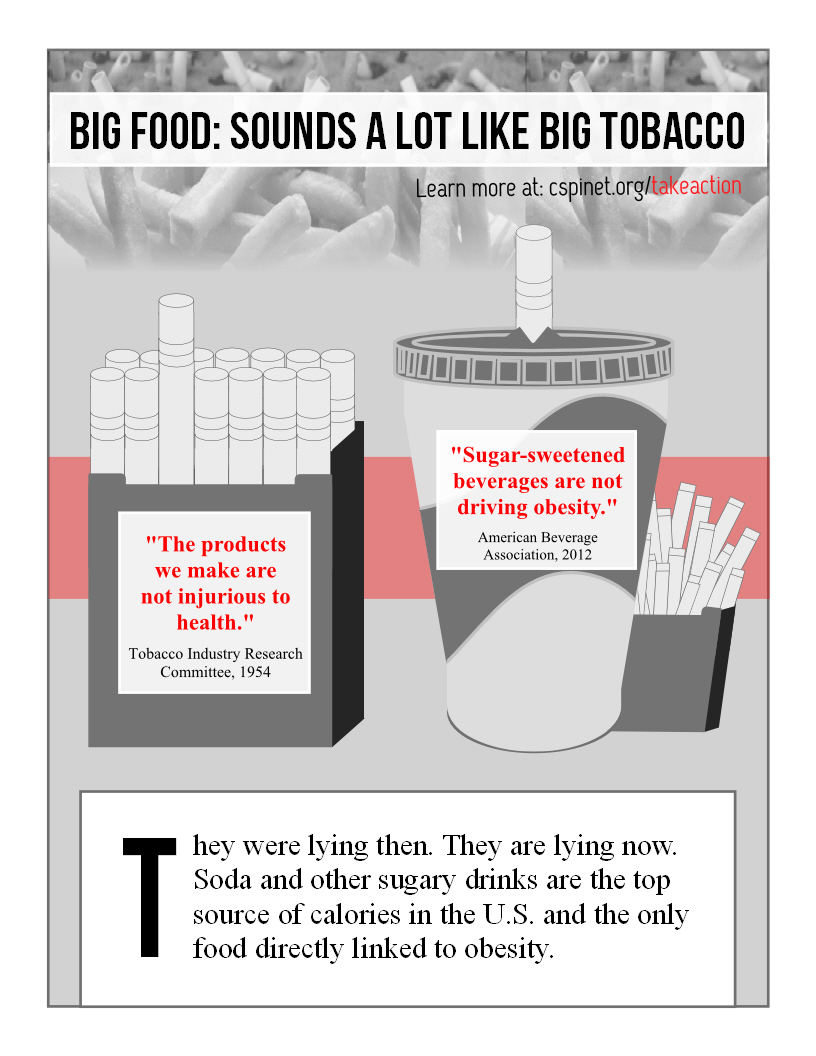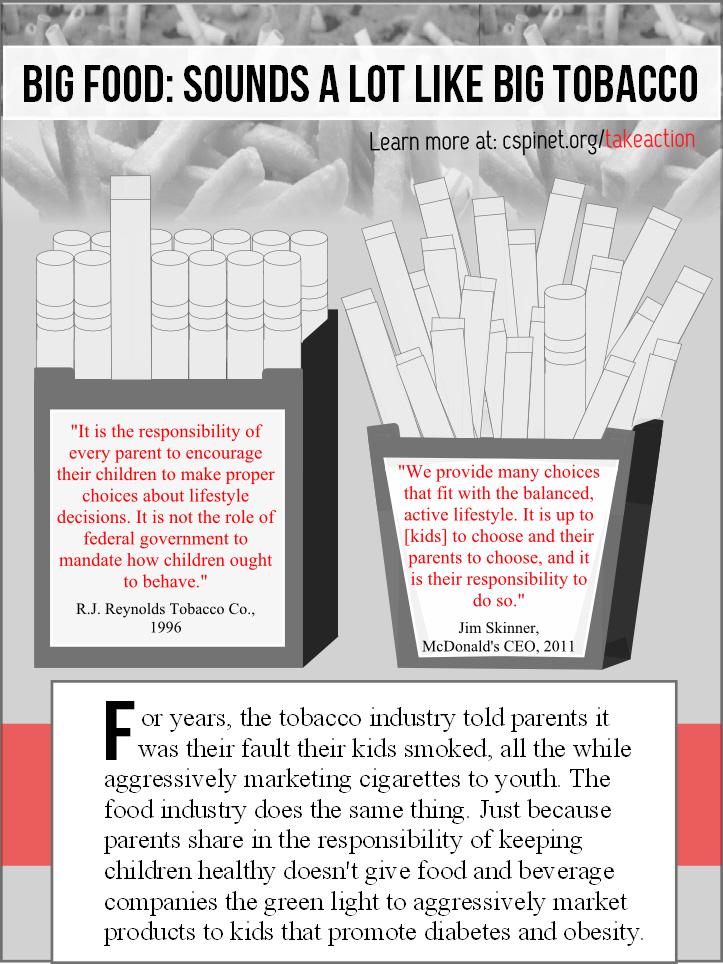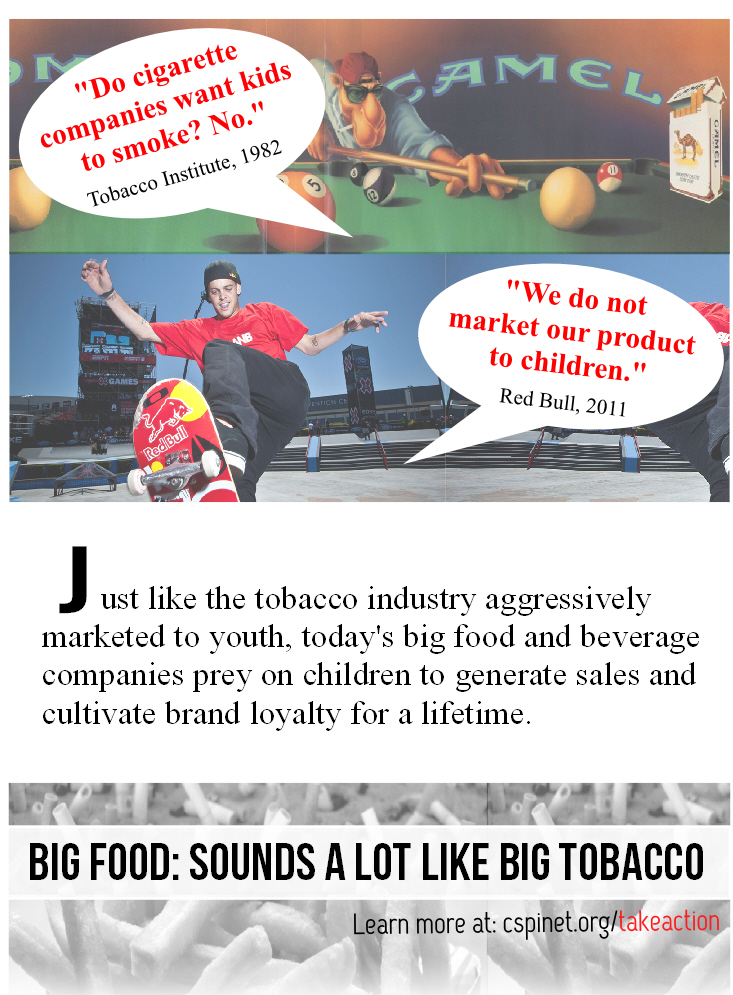
Big Food: Sounds A Lot Like Big Tobacco
The similarities between unhealthy food and tobacco go beyond the health effects. When it comes to corporate responsibility, executives at some of the nation’s largest food and beverage companies seem to have learned a lot from their counterparts at Big Tobacco in aggressively promoting consumption of unhealthy foods and, in the same breath, blaming the consumer.
Big Food and Big Tobacco share some common bloodlines. It wasn’t very long ago that some of these companies were one and the same. RJR Nabisco, for instance, once simultaneously contained the companies that made Camel cigarettes and Chips Ahoy! cookies. Until the mid-2000s, the companies that manufacture Marlboro and Virginia Slims cigarettes were part of the same conglomerate, Philip Morris (now Altria), which manufactured Kraft Macaroni & Cheese and Kool Aid. Those companies have since split their tobacco businesses from their food businesses, but heavy-handed product marketing may be ingrained in the companies’ DNA.
While we need food to live, we certainly don’t need many of the junk foods—many aimed at kids—served up by food processors and restaurants. Soda and other sugary drinks, in particular, are one category of food that does far more harm than good. Sugary drinks are the single biggest source of calories in the American diet and prime culprits when it comes to diabetes, heart disease, obesity, and other health problems.
Like Big Tobacco, Big Food goes to great lengths to muddy the waters and obscure the connections between soda and disease. “The products we make are not injurious to health,” is how the Tobacco Industry Research Committee put it in a 1954 advertisement. In 2012 the American Beverage Association opined, “Sugar-sweetened beverages are not driving obesity.” Coca-Cola executive Katie Bayne told this whopper to USA Today: “There is no scientific evidence that connects sugary beverages to obesity.”
Besides denying the connections between their products and disease, food and tobacco companies both use the same language to blame their customers for the harm caused by their products. “What people want to do is their own decision,” said American Tobacco CEO Robert Heimann in 1988. More recently, Don Thompson, then CEO of McDonald’s, said “All of us have to make personal choices.” Those statements may be literally true, but ignore the extent to which companies persuade, lure, and manipulate customers—including children—into making the very decisions that companies say should be up to them.
Though both food and tobacco companies have been notorious marketers to children, they both like to lecture parents: “It is the responsibility of every parent to encourage their children to make proper choices about lifestyle decisions,” is how RJ Reynolds Tobacco Company put it in the mid-1990s. It’s not the role of the federal government to discourage kids from smoking, it went on to say. In 2011, McDonald’s CEO Jim Skinner said “It is up to [kids] to choose and their parents to choose, and it is their responsibility to do so.”
Joe Camel, the cartoon animal used to attract children to cigarettes, was retired in 1997, under pressure from state attorneys general. A master settlement agreement between the AGs and the tobacco industry eliminated much of that industry’s advertising to children, and even disbanded the Tobacco Institute, an aggressive industry lobbying force. But the food industry still uses cartoon characters to market disease-causing products to children, and food industry trade groups still devote millions to block progress and defend the status quo.
Big Tobacco and Big Food are now separate industries, but the playbook is much the same. How the game ends is up to us.




